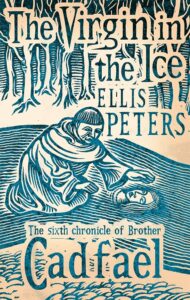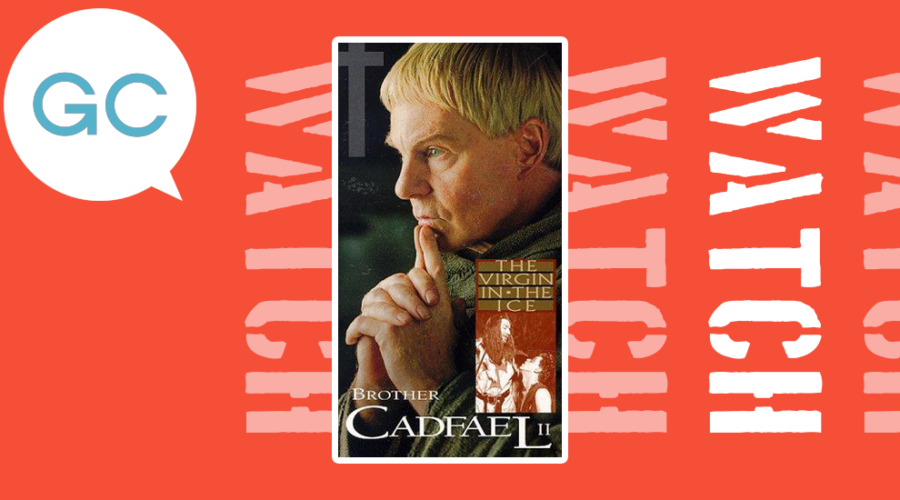This month over at Five Books For, we’ve been exploring wintry books that are perfect for reading on cold nights, especially if you’re wrapped up warm in front of a fire. With that in mind, this month’s Great Adaptation is The Virgin In The Ice by Ellis Peters, part of the Cadfael series of detective stories featuring a mediaeval monk who just happens to solve murders.
The Virgin In The Ice is the sixth book in the series and while all of them are worth reading, this is the one that immediately sprang to mind when I was thinking of wintry books.
Ellis Peters is actually the alias of Edith Pargeter, a remarkable woman and prolific writer who lived in Shropshire (like Cadfael himself).
 We join Cadfael in the year 1139, and England is at war with itself. The Empress Maud is battling her cousin Stephen of Blois for the throne and law and order has broken down. Historians will later name this period The Anarchy and it will last for 15 years. In Shrewsbury, Brother Cadfael lives a quiet life at the Abbey, serving as a monk with his fellow brothers, growing herbs in the Abbey gardens and treating people’s sicknesses and wounds with his preparations. Cadfael fought in the Crusades but eventually became disillusioned with life as a soldier, and returned to England to take up his vows as a monk.
We join Cadfael in the year 1139, and England is at war with itself. The Empress Maud is battling her cousin Stephen of Blois for the throne and law and order has broken down. Historians will later name this period The Anarchy and it will last for 15 years. In Shrewsbury, Brother Cadfael lives a quiet life at the Abbey, serving as a monk with his fellow brothers, growing herbs in the Abbey gardens and treating people’s sicknesses and wounds with his preparations. Cadfael fought in the Crusades but eventually became disillusioned with life as a soldier, and returned to England to take up his vows as a monk.
Life at the Abbey is largely sheltered from the worst of the war but the violence intrudes when two children go missing during the Empress’ attack on the city of Worcester. The children are being searched for by their uncle, but as a supporter of the Empress he is barred from entering the lands around Shrewsbury, which are loyal to King Stephen. It’s a bitter winter, and while out on monastery business, Cadfael finds one of the missing children. On the journey back to the Abbey, he notices the body of a young woman frozen in a stream, but hides the discovery from the boy in his care in case it turns out to be his sister. Cadfael and his friend Hugh Beringar must return to collect the young woman’s body, and work out who has killed her, as well as piecing together the movements of the missing girl.
Little does Cadfael realise quite how shocking the outcome of this case will be, or the links it will have to his own past.
The Cadfael books by Ellis Peters are an enduring favourite of mine for lots of reasons: Cadfael himself is a brilliant detective, a kind of mediaeval Sherlock Holmes with a common-sense, logical approach to both the more opaque motivations behind a crime and the forensic evidence he manages to collect from the bodies and crime scenes he encounters. He’s also very human: driven by kindness and decency but with a full and interesting past, Cadfael isn’t a typical monk in the sense that the cloistered life he lives has been chosen later, after doing other things and living in the outside world. This gives him a useful perspective when he’s investigating but often attracts the ire of some of his fellow brothers, who after all are just as susceptible to petty rivalries and jealousies as their laymen counterparts.
The cast of characters is well-drawn and Cadfael’s friendship with Hugh Beringar in particular is a highlight of the series and the relationships of the various monks also add a layer of humanity to the stories. The plots are always well-paced without feeling rushed and there’s often a subplot involving some star-crossed young lovers who invariably need Cadfael’s assistance to untangle all the obstacles to their relationship. Peters is brilliant at making sure that any subplots don’t feel extraneous but are braided into the main narrative so that everything feels integrated and the insights into what life was like for normal people in the 12th century is fascinating and really brings the period to life.
If you love detective fiction, especially of the cosier variety (I wouldn’t describe this as cosy per se but it sits closer to the cosy end of the spectrum than the gritty end), or well-written historical fiction then this could be the perfect series to try.
Thirteen of the twenty novels were adapted for TV back in the 1990s, with Derek Jacobi playing Cadfael and lots of familiar faces in the supporting roles. Jacobi is the perfect Cadfael, and I don’t often feel that way about an actor who’s playing a character I love, but he does the role so much justice. He is obviously a brilliant actor generally but this really was inspired casting.
This holds true for the rest of the cast too; Terrence Hardiman brings just the right mixture of levity and gravity to his role as Abbot Radulfus and Julian Firth is entertainingly spiteful as Brother Jerome. There seem to be some strong opinions out there on which actor played Hugh Beringar the best but for our purposes today discussing this particular episode, Eoin McCarthy is great.
While it’s clearly a 90s show, and not in HD, one of things I liked about this episode is that the snow doesn’t look quite as unconvincing as snow often does on TV and in movies, something that I’m noticing even more at the moment when I’m watching (even brand new!) Christmas films. Why does so much ‘snow’ just look like a blizzard of polystyrene? However, here it looks broadly convincing and the snowy landscape settings look appropriately frosty too which is pleasing.
While some of the plot points have been changed (I believe in order to reduce the number of speaking roles), the show keeps the most vital points of the story and there are some touching scenes (expertly acted by Jacobi) when he realises who the children’s protector really is.
If you love watching historical eras brought to life and you’re a fan of great acting then the series is sure to be a delight. I do think this is an instance where it’s worth reading the books first but the series is strong enough to stand alone too.
I’d love to hear your thoughts on Cadfael, book or series – let us know what you think on our social channels below!

